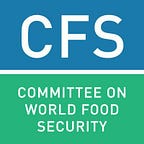We can’t do it alone: How to leverage multi-stakeholder partnerships to address hunger and malnutrition in the world
Addressing the challenges that the world faces to eliminate hunger and all forms of malnutrition is a complex, multi-faceted issue that requires a holistic approach, with multiple partners involved in finding workable solutions. The Sustainable Development Goals (SDGs) of the 2030 Agenda for Sustainable Development also encourages the use of partnerships as one of the ways to implement the ambitious Agenda, as outlined in SDG 17, which encourages “the global partnership for sustainable development, complemented by the use of multi-stakeholder partnerships” (MSPs).
In other words — we can’t do it alone — and we all need to work together to pool our resources, find workable solutions, scale up good practices, as well as leverage funds to support these efforts.
This was part of the impetus for the Committee on World Food Security (CFS) to request the High Level Panel of Experts on Food Security and Nutrition (HLPE) to prepare a report in 2018 on Multi-stakeholder partnerships to finance and improve food security and nutrition in the framework of the 2030 Agenda.
The HLPE report explores what is meant by an MSP and what are some of the strengths and challenges of engaging in such mechanisms. An open consultation, using a detailed questionnaire, was used to help gather systematic information on the different types of MSPs, in terms of thematic area, scope and structure. Based on the scientific literature and on the results of this consultation, the HLPE identified five main domains of intervention for MSPs, all closely inter-connected, namely:
· knowledge co-generation and capacity building; in particular through the collection and sharing of information and experiences;
· advocacy — such as raising awareness on FSN issues and promoting solutions;
· standard setting — working together to propose and establish common approaches and practices;
· action — focusing on specific activities within a sector or thematic entry point;
· fundraising and resource mobilization — developing more targeted and innovative financing mechanisms for better coordinated use of public and private funds.
The report explores the potential benefits and limitations of the different types of MSPs, recognizing that there may be overlap between the categories.
For example, one obvious benefit is when MSPs are formed to complement or supplement human, technical and financial resource needs. MSPs can also lead to more mutual understanding of the key FSN issues and situations, as well as provide a means for sharing good practices and experiences. This is especially crucial when partners have diverse views and interests so that they reach agreement on the situation and possible solutions that all can get behind.
However, pooling resources and reaching mutual understanding is not always an easy task. In forming MSPs there are often tensions and conflicts of interest to sort out, especially when there are power asymmetries among the partners. There are also increased transactions costs in establishing and maintaining MSPs, which require more time and flexibility than by operating alone. Partners need to invest the time to make the partnership effective if they hope to realize the potential benefits mentioned above.
The HLPE report explores some of the aspects of what makes a successful MSP in supporting FSN objectives, building on the strengths and challenges identified. Some aspects to keep in mind for establishing a successful MSP include:
· identify the relevant stakeholders to be involved and agree on the what FSN problem or issue they will address — key to have a common understanding
· elaborate a shared vision for the ‘group’ to address the agreed problem
· clearly identify the roles and responsibilities for the different partners
· create a governance structure that will work for the group, bearing in mind the power asymmetries and ensure voices are heard from all partners
· design and implement a common strategy
· regularly monitor and evaluate the results and the process
Taking into account the diversity of MSPs, and, the fact that they are not an end in themselves, but a means to an end, the HLPE report notes that:
Multi-stakeholder partnerships (MSPs) should be an integral part of strategies, plans and programmes across sectors to achieve food security and nutrition (FSN) goals and targets. They offer innovative mechanisms that can contribute to finance and improve FSN. However, MSPs do not replace the need for continued public investment in FSN. There are a number of constraints or limitations that need to be addressed to ensure that MSPs are transparent and accountable and that their efforts are aligned with global, regional and national priorities…
The HLPE suggests in this report 5 recommendations for CFS consideration:
1. Establish a policy framework to ensure that MSPs contribute effectively to FSN objectives
2. Improve mobilization, coordination and targeting of financing for FSN through MSPs
3. Strengthen transparency and accountability in MSPs through effective governance and management principles
4. Increase the impact of MSPs through effective monitoring, evaluation and experience sharing
5. Integrated different forms of knowledge and explore further areas of research on MSPs to finance and improve FSN.
MSPs are not the answer to every challenge facing FSN, but if done effectively, they may offer more buy-in on what the issues are and what can be done about them. Very much like CFS itself — which considers the views of many — there are transaction costs in terms of time, especially when there are many diverse views. And as highlighted in the 2030 Agenda — time is running out and we need to use appropriately all the tools we have to achieve the 2030 Agenda and eradicate hunger and all forms of malnutrition.
Mark McGuire is the Secretary, ad interim, of the Committee on World Food Security (CFS), based in the United Nations Food and Agriculture Organization (FAO) in Rome, Italy. The views expressed in this article are those of the author and do not necessarily reflect the views of CFS or FAO.
